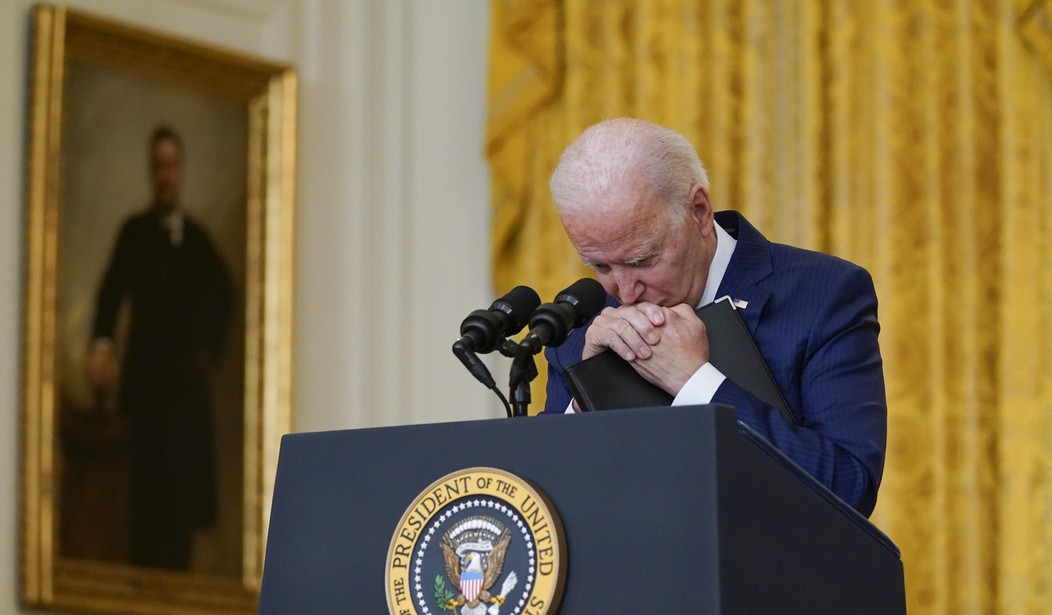At the 1980 Republican National Convention, Ronald Reagan expressed the foundation of his foreign policy, known as the Reagan Doctrine. “We know only too well that war comes not when the forces of freedom are strong, but when they are weak,” he said. “It is then that tyrants are tempted.”
It’s hard not to think about that today, in the wake of Afghanistan’s fall to the Taliban, in the aftermath of the terror attacks at Kabul airport that took the lives of more than a dozen U.S. service members.
It’s impossible not to think about that after Biden’s mumbling, bumbling speech on Thursday.
When Joe Biden finally appeared before the media, nearly nine hours after the first attack on the Abbey Gate at the Kabul airport, it was immediately apparent that he was not well. He seemed weak and shaken. Some even described his demeanor as “looking drugged.”
Things started getting really bizarre when he, apropos of nothing, recalled his late son Beau. During the campaign, Biden often invoked his late son as the ultimate shield from criticism. Barack Obama had (and used) the Race Card. Joe Biden does not, so he must make do with the Grieving Father Card. As PJ Media editor Paula Bolyard noted, Biden “bizarrely suggest[ed] that his son’s cancer was somehow the result of his military service.” It was odd but undeniably typical of Joe Biden, who must know that the disaster he created in Afghanistan will forever define his presidential legacy, the final chapter in the story of his decades of terrible foreign policy decisions.
But it was when Biden tried to sound tough and in charge that I began to cringe.
“To those who carried out this attack, as well as anyone who wishes America harm, know this,” Biden began. “We will not forgive. We will not forget. We will hunt you down and make you pay.”
He was like a bad actor reading a script who failed to convince the producer he’s right for the part. The only problem is that the part is already his, and we’re stuck having to watch his unconvincing performance for a role he wasn’t suited for. It was a far cry from George W. Bush’s impromptu moment at Ground Zero with the bullhorn, responding to a firefighter who couldn’t hear him. “I can hear you, the rest of the world can hear you and the people who knocked these buildings down will hear all of us soon.”
You knew President George W. Bush meant business and was ready to face the threat of terrorism head-on. Joe Biden’s weak-kneed promise about hunting down those responsible for the terror attacks at Kabul was laughable by comparison.
Yet, the worst was yet to come. Later, when, to the shock of many, he actually answered questions from the media, the man who had read tough talk off the teleprompter moments earlier cowered like a frightened child as Fox News’ Peter Doocy asked him a question.
“Mr. President, there had not been a U.S. service member killed in combat in Afghanistan since February of 2020. You set a deadline. You pulled troops out. You sent troops back in. And now 12 Marines are dead. You said the buck stops with you. Do you bear any responsibility for the way that things have unfolded in the last two weeks?”
At this point, Biden was clutching his folder, like a child holding a teddy bear, as if it were a shield. Then his head collapsed onto his hands.
“This is what weakness looks like,” Donald Trump Jr. said of the moment in a tweet.
This is what weakness looks like. pic.twitter.com/a7vqlqYUhU
— Donald Trump Jr. (@DonaldJTrumpJr) August 26, 2021
He was right. And the moment is even worse when you see it on video.
Does this look like a man that our enemies fear? Of course, it doesn’t.
As Rep. Jim Banks (R-Ind.) said on Thursday, ISIS has been waiting for a president like Biden to take advantage of. “You’re hearing more and more about ISIS…ISIS is not a new dynamic in Afghanistan,” he explained to Fox News’ Harris Faulkner. “They’ve been building up there for about over three years, waiting for a moment like this, waiting for a president like Joe Biden to create a chaotic situation like what he has, to strike, and we saw what’s happened over the last couple of hours. We’re going to see a lot more of that to come in the days ahead.”
Since the disaster in Afghanistan began, America’s reputation abroad has plummeted. While our allies may not always agree with our country, they respected our strength as the world’s number one superpower. The events of the past couple of weeks have diminished our perceived strength and we’ve lost respect.
Donald Trump was highly criticized during his presidency, but he did more to achieve peace than any president in my lifetime. When he left office, several Arab countries had made peace with Israel in an agreement he brokered, and Afghanistan was stable. As Trump pointed out in a statement last week, the disaster in Afghanistan never would have happened if he was president. “The Taliban knew I would rain down fire and fury if any American personnel or interests were harmed, the likes of which have never been seen.”
But they knew that Biden, the man who pathetically clutched his folder in a defensive posture in the face of questions from the media, would not. And will not.
“Peace through strength” is not an outmoded concept. President Trump gave us peace through strength. Joe Biden gave us conflict through weakness.
And the world is watching.










